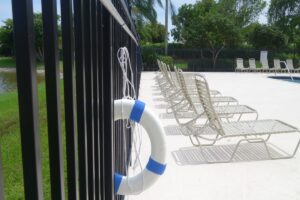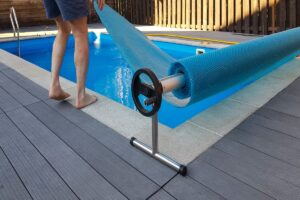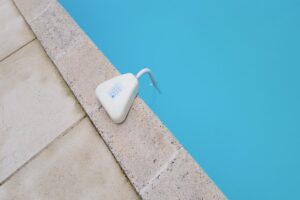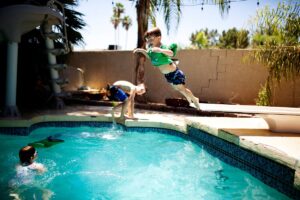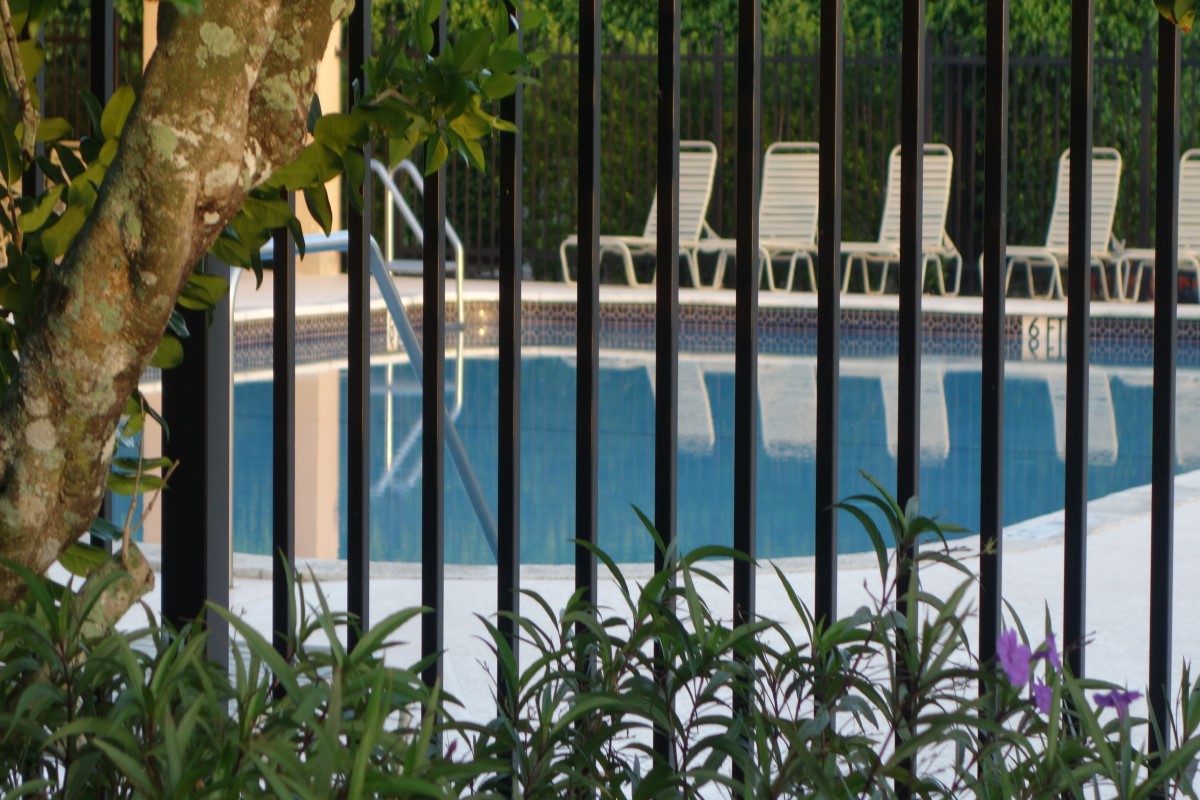
Properly childproofing your pool means making it impossible for children to enter the pool without your supervision. Drowning is the second leading cause of unintentional injury in children. Additionally, thousands of children are hospitalized with brain damage or other injuries in swimming-related accidents according to the Red Cross. Most drowning happens in home swimming pools. Lack of supervision is one of the biggest reasons for this. Proper pool safety measures minimize the risk of drowning. To keep everyone safe this summer, follow AquaMobile’s tips to childproof your pool!
1) Pool Fences and Gates
Pool fences help prevent drowning. Pool fences differ from garden fences because they are designed to prevent small children from getting into the water. A child-safe pool with a fence keeps the space off-limits between supervised swims. Be sure to check your city’s building code or contractor before building your pool fence.
A pool fence should always be accompanied by a gate. Be sure that it has a latch that’s out of a child’s reach. This ensures that it will not be lifted. You can also consider adding a lock to the pool gate. This way, children will have to wait for you to unlock the gate before going for a swim.
2) Pool Covers
Pool covers provide an extra level of protection and are designed to keep kids out of the pool. Proper pool covers securely attach to each end of the pool. If a pool cover collects rainwater, pump or drain the water out. Even a few inches of water on a heavy pool cover can be dangerous to a wandering child.
There are a variety of pool covers available. Vinyl covers are held in place by weights but become unsafe when children climb on top of them. Self-draining mesh covers with a spring-based fastening system are a bit safer. This cover pretty well disappears when it is not being used. There are high-tech options for pool covers too. With a flick of a switch, your pool can be sealed!
3) Alarms
Alarms make sure your pool is secure regardless of where you are. A pool alarm detects any movements that happen in or around the pool. A floating alarm detects waves on the surface level. While an underwater alarm will focus on waves beneath the surface. You can even purchase a remote control for your pool alarm.
A fence alarm is a good alternative to a pool alarm. If you already have a pool fence, be sure to get one of these. This can let you know if a child is entering the pool area. It’s also a good reminder for adults who might forget to close the gate.
4) Keep Pool Area Tidy & Safe
The area surrounding your pool should be neat. You wouldn’t leave your house with things lying around. So why do that to your pool? Here are a couple of tips to remember:
- Repair your pool deck when it gets damaged. Coat it with a non-slip solution when slippery
- Keep glass plates and glasses away from the poolside area
- Clear toys and shoes from the pool’s edge to prevent trips or falls
- Routinely inspect all electrical equipment
- Be sure rescue gear like life preservers, kickboards, ropes and poles are available
Being prepared is the best way to prevent injury. That’s why you should keep all of your facilities up to date. Keeping the pool deck clear will stop people from tripping or falling into the pool. Also by having the right gear on hand, you will know how to rescue someone in the event of an emergency. Consider hiring a lifeguard for big events like pool parties!
5) Create Pool Rules (And Stick to Them!)
Pool rules make sure children stay safe in and around the pool. Additionally, it forces them to be aware of their surroundings. Here are a couple of our suggestions:
- No running, pushing or horseplay near the pool
- Children can only enter with adult supervision
- No swimming alone
- Glass is not allowed near the pool
- No swimming when sick or injured
There is no replacement for adult supervision and vigilance. This is regardless of the alarm system, fence or pool cover that you have. Always supervise children when they are swimming or in the pool area.
There are many ways to childproof your pool. However, teaching your kids how to swim, float and be comfortable in the water is the best form of protection. Proper training and swimming lessons will help you feel secure. It also ensures your children know how to react in the event of an emergency. Learn more about our private swim lessons and how to keep your child safe in the water today!

